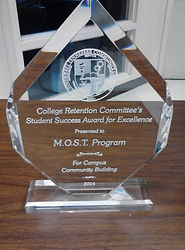The Minority Education Initiative (MEI), is a non- profit organization, made up of educators, policymakers, professionals in the public and private sector and other individuals committed to ensuring that secondary and post-secondary educational opportunities are appropriate and accessible to students from disadvantaged backgrounds.The mission of MEI is to increase awareness, access, and actualization of a college degree for minorities as a means of improving quality of life. Through workshops, trainings, and conferences we hope to bring attention to this important topic.
PHONE: 404-889-6577
EMAIL: ADMIN@MEICOLLABORATIVE.COM
PROGRAM SPOTLIGHT

SOUTHWEST TENNESSEE COMMUNITY COLLEGE

The Project M.O.S.T./PBI has been very successful at hosting activities geared towards keeping their students highly engaged while also aiding in their efforts to be successful students. These efforts have also been instrumental in helping the program in reaching its goals of increased retention and graduation efforts among African-American male students at Southwest Tennessee Community College.
Included are the following:
· Final Report on Summer Entrepreneurial Institute
· MOST Summary of Outcomes Fall 2012 – Spring 2014
· 2014 Student Success Award from the Office of Retention and Graduation
· Articles highlighting activities, awards, overall success
M.O.S.T. Summary of Outcomes 2012
Men-In-Black
Program
Southwest's 2014 Faculty & Staff Awards Review
Project M.O.S.T. REACHES 1st YEAR ANNIVERSARY
Project M.O.S.T. Moves Forward During Summer Session
Greg Duckett Addresses Project M.O.S.T. Article
Project M.O.S.T. Final Report
NEWS & INFO

Black Male Student Initiative Boosts Retention And Graduation Rates At UTC
A highly structured program focused on more than success in the classroom is increasing the number of black male graduates at UTC. Student Support Services launched the University’s first-ever black male initiative, Black Males on Campus in fall 2010 to promote the retention of black male students so that they can succeed and graduate from UTC. Not only does this program focus on success in the classroom, it also addresses social, cultural, emotional, personal and financial issues.
SSS works to “retain and graduate students from diverse and disadvantaged backgrounds at the highest possible rate and foster an academically focused climate supportive of the success of students.”Before BMOCS was created, black males who participated in SSS lagged behind other students in educational attainment. In fact, only 32 percent of black males entering SSS in fall 2002 earned a bachelor’s degree within six years, compared to 63 percent for other SSS students.
“I could not accept this distributing trend as a permanent reality and thought that it was time to be responsive and create a program to focus on this subgroup of students,” Shirl S. Gholston, director of Student Support Services said. BMOCS is modest in size, but the results are impressive. By focusing on these young men, the one-year retention rate of black males in SSS increased to 94 percent by fall 2013. During the same period, the six-year graduation rate of black males in SSS dramatically jumped to 74 percent. This group rose from having the lowest retention and graduation rates to achieving the highest retention and graduation rates of the entire SSS student population.
“Among our various activities, the most engaging and transforming have been the monthly rap sessions," explained Christopher Stokes, who is responsible for the implementation of the initiative and works as the SSS Academic Advisor. "These interactions allow for the young men to tackle serious issues specific to their demographic while finding support and empowerment in college as they venture forward with their career goals.” Five young men received $1,000 in the first BMOCS scholarship competition for spring 2014. Criteria for scholarship winners included a cumulative GPA of 2.70 or higher, involvement in BMOCS programming and SSS financial education, and demonstration of leadership skills and volunteer experience. In addition to the scholarship winners, many other students have been impacted by BMOCS as well.
Christopher Whitehead joined BMOCS in 2010 and is on track to graduate in May 2014. “BMOCS is a great way to network with other black men looking to achieve one common goal, success. Confidence is the main thing I got from the experience,” he said. Oluwatosin Ayotunde, a BMOC and SSS tutor, says, “The program has provided extra opportunities to help me be successful. Anyone who can should take advantage and become a member.” The program also strives to promote the success of BMOCS by building partnerships –it’s a team effort. Black male students are also encouraged by UTC staff, faculty and administrators, as well as community leaders. Although the initiative addresses issues relevant to black male students, any SSS student may join BMOCS.

Report: Steady College Enrollment Growth for Underrepresented Minorities, College Completion Rates Increasing More Slowly
Newly-released analysis of U.S. Education Department data shows that from 2009 to 2011, the rate at which Black and Latino students entered four-year colleges and universities considerably outpaced that of Whites, while six-year graduation rates for underrepresented minority students increased only slightly, according to the Washington-based Education Trust organization.
In the organization’s “Intentionally Successful: Improving Minority Student College Graduation Rates” brief, Education Trust officials described the findings as “encouraging news for those concerned about closing access and success gaps” in American higher education.

African American Males: Relationships Among Racial Identity, College Type, and Wellness

Diversity in Higher Education Remains an Essential National Priority
Attached is an open letter  (.pdf) signed by COE (along with 37 other education and civil rights groups) in response to the Supreme Court’s decision to return the case, Fisher v. University of Texas at Austin et al., to the Fifth Circuit for review. And while it is expected that there will not be a final decision for some time, COE strongly backs the words included in this open letter — that “a diverse student body enables all students to have the transformational experience of interacting with their peers who have caries perspectives and come from different backgrounds.”
(.pdf) signed by COE (along with 37 other education and civil rights groups) in response to the Supreme Court’s decision to return the case, Fisher v. University of Texas at Austin et al., to the Fifth Circuit for review. And while it is expected that there will not be a final decision for some time, COE strongly backs the words included in this open letter — that “a diverse student body enables all students to have the transformational experience of interacting with their peers who have caries perspectives and come from different backgrounds.”
This open letter was published in yesterday’s Chronicle of Higher Education (page A 11) and was also a featured as a banner advertisement on Inside Higher Ed’s website (July 18th). COE also expects this letter will be featured in Diverse Issues in Higher Education and there is the possibility that it will run in other publications in the future. We will let you know when and where these future placements occur.

Reflections on Pell — Championing Social Justice through 40 Years of Educational Opportunity
Washington, D.C. — To commemorate the 40th Anniversary of the Pell Grant, the Pell Institute for the Study of Opportunity in Higher Education is proud to announce the release of “Reflections on Pell — Championing Social Justice through 40 Years of Educational Opportunity.” The volume  (.pdf) is composed of personal reflections, historical essays, and policy recommendations expressing the powerful contribution the Pell Grants have made in the lives of countless students over the last four decades as well as deep concern about the future and sustainability of the program. “This volume has advanced the fight for support for equal access to opportunity in higher education for all,” said Margaret Cahalan, director of the Pell Institute. “We thank the contributors for their passion, commitment, and expertise.”
(.pdf) is composed of personal reflections, historical essays, and policy recommendations expressing the powerful contribution the Pell Grants have made in the lives of countless students over the last four decades as well as deep concern about the future and sustainability of the program. “This volume has advanced the fight for support for equal access to opportunity in higher education for all,” said Margaret Cahalan, director of the Pell Institute. “We thank the contributors for their passion, commitment, and expertise.”

Parental Characteristics, Ecological
Factors, and the Academic Achievement of African American Males
African American males, in general, are in a dire situation in the
United States (Noguera, 2003; N. Williams, 2006). According
to a 2006 New York Times article, Columbia, Princeton, and
Harvard University experts agree that the rapidly increasing
population of poorly educated African American men is “becoming
ever more disconnected from the mainstream society”
(Eckholm, 2006, p. 1). National statistics and studies have
indicated that African American males are overrepresented in
juvenile detention centers and prisons (Snyder & Sickmund,
2006), overrepresented in special education classes (Garibaldi,
2009), underrepresented in secondary school honors and advanced
courses (Whiting & Ford, 2009), underrepresented on
college campuses (Toldson, Braithwaite, & Rentie, 2009), and
consistently reported as academically underachieving in today’s
schools (Entwistle, Alexander, & Olson, 2004; Mandara, 2006).
Currently, 58% of Black high school graduates attend college (National Center for Education Statistics [NCES], 2003); however, fewer than half graduate (Carey, 2004). These figures obscure significant within-group variation, in that among African Americans, females predominate in college environments, composing 63% of Black enrollments; furthermore, 40% of Black women but only 34% of Black men graduate (NCES, 2003). Wilson (2000) noted a recent unexplained decline in the number of traditional-age Black males completing college, making it possible to describe those who do
finish as a unique cadre of successful Black men. Little is known about their strengths or how those strengths may serve as a foundation for counseling.





